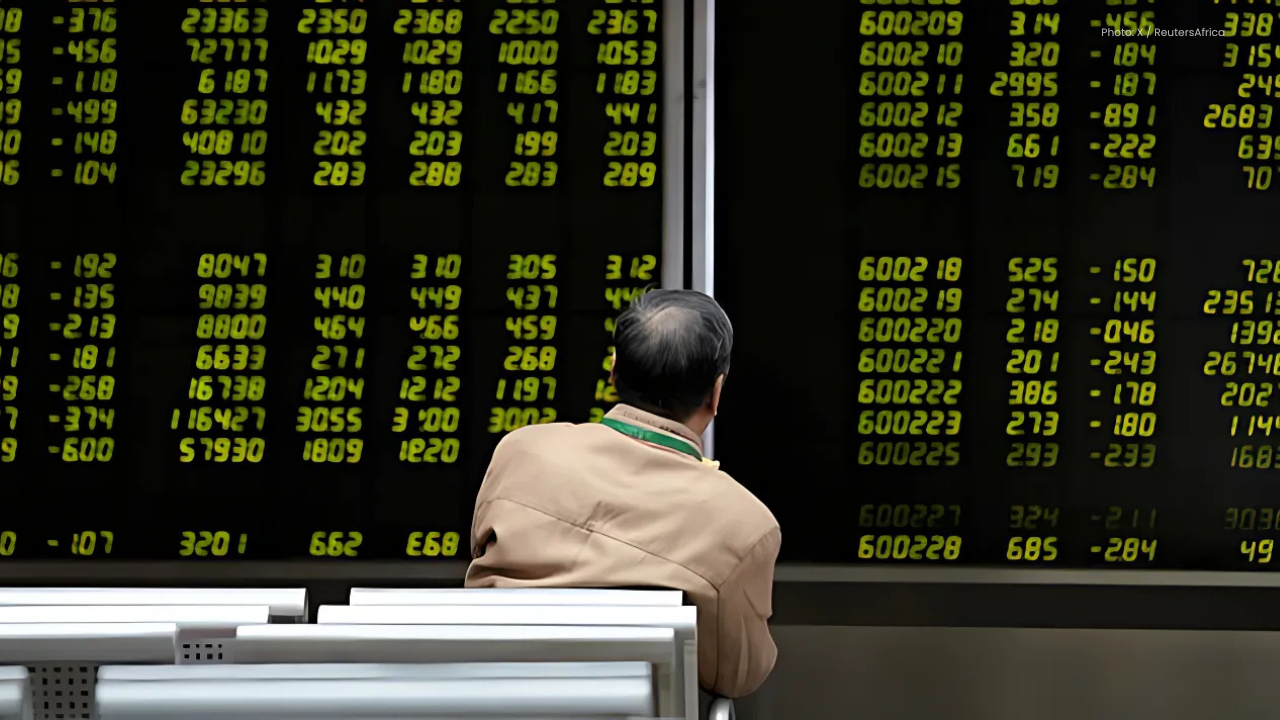
Post by : Naveen Mittal
Asian stock markets finished the week mostly higher, showing strength despite some challenges. Japan’s Nikkei index, however, slipped after the Bank of Japan (BOJ) hinted at a tougher stance on monetary policy. Investors across the world are carefully watching central banks, currency changes, and global business news to understand where markets are heading.
On Friday, the Bank of Japan decided to keep short-term interest rates steady at 0.5%, which was expected. But the real surprise came when two members of the BOJ voted for a rate hike. This showed that the central bank is starting to think more seriously about ending its ultra-loose monetary policy.
Another unexpected step was the BOJ’s decision to begin selling its large holdings of exchange-traded funds (ETFs) and real estate investment trusts (REITs). These sales signal a gradual move toward normalizing policy, which could create pressure on Japanese stock markets.
The Nikkei index, which had hit a record high earlier in the day, reversed its gains and ended down 0.3%. Even so, it still managed a 0.9% rise for the week.
Data showed that Japan’s core inflation was 2.7% in August, the slowest in nine months. While inflation is cooling, it remains above the BOJ’s 2% target. The debate inside the central bank is clear: some members believe inflation is strong enough to allow for higher interest rates, while others still want to move cautiously.
The outcome shook markets. The Japanese yen strengthened, with the dollar falling 0.3% to 147.51 yen. At the same time, the 10-year Japanese government bond yield rose 4 basis points to 1.635%, close to its highest level since 2008.
Market experts said the dissenting votes at the BOJ show a real shift.
Charu Chanana, chief investment strategist at Saxo, explained:
“While the majority still prefer a steady path, the fact that two members voted against shows the discussion is moving toward faster policy changes. That could be a headwind for indices like TOPIX and Nikkei, depending on how quickly and clearly the BOJ moves.”
Earlier in the week, central banks in the United States, Canada, and Norway cut interest rates, raising hopes of more global economic support. The Bank of England decided to keep rates steady. These moves created optimism that the global economy could see easier financial conditions in the near future—although Japan is heading in the opposite direction.
While Japan’s Nikkei dipped, other Asian markets had stronger results:
South Korea’s KOSPI index fell 0.7% on Friday but still gained 1.3% for the week. Over the past two weeks, it has risen more than 7%, showing strong investor confidence.
MSCI’s Asia-Pacific index outside Japan slipped 0.2% on Friday but was up 0.6% for the week, staying close to a four-year high.
Chinese blue-chip stocks (CSI300) rose 0.6%.
Hong Kong’s Hang Seng index edged down 0.1% as traders waited for an expected phone call between U.S. President Donald Trump and Chinese President Xi Jinping.
The U.S.–China relationship remains important for markets, with issues like a TikTok deal, Huawei’s chip plans, and Beijing’s restrictions on Nvidia AI chips drawing global attention.
Overnight in the U.S., major indexes continued their record-breaking run:
S&P 500, Dow Jones, and Nasdaq all closed at record highs.
Jobless claims data came in better than expected, boosting confidence.
Nvidia announced a $5 billion investment in Intel, which lifted tech stocks. Intel’s shares jumped 23%, while Nvidia gained 3.5%.
These moves in the U.S. helped support Asian markets, despite local concerns in Japan.
The dollar index recovered slightly, holding at 97.38, after touching a multi-year low earlier in the week.
The British pound slipped 0.6% to $1.3546 as the Bank of England left interest rates unchanged at 4%.
In the U.S. bond market, the 10-year Treasury yield rose 2 basis points to 4.12%, marking its third straight session of gains.
Oil prices weakened due to concerns about U.S. fuel demand. U.S. crude slipped 0.3% to $63.38 per barrel, while Brent crude fell 0.2% to $67.32.
Gold prices climbed 0.4% to $3,658 an ounce, as investors sought safety amid global uncertainty.
Asian markets are ending the week in positive territory overall, supported by strong performances in South Korea and China, as well as record highs on Wall Street. But Japan’s market is under pressure after the BOJ’s hawkish signals, which included dissenting votes for a rate hike and plans to sell assets.
The coming weeks will be important, with investors watching BOJ Governor Kazuo Ueda’s press conference for further signals, and keeping an eye on U.S.–China talks that could shape trade and technology relations.
Markets remain hopeful, but the BOJ’s shift is a reminder that central bank decisions can quickly change investor confidence.
#AsiaMarkets #Nikkei #BOJ #StockMarket #GlobalEconomy #WallStreet #Investing #Japan #Inflation #BusinessNews










OpenAI's Revenue Soars to $4.3 Billion in First Half of 2025
OpenAI's revenue reaches $4.3 billion in the first half of 2025, marking a 16% increase from the pre

UAE Leaders Send Condolences to Saudi King Over Princess Abta's Death
UAE rulers and crown princes sent heartfelt messages to King Salman, mourning the passing of Princes

Brazil's Surplus Clean Energy Attracts Crypto Miners
Brazil's excess renewable energy is luring cryptocurrency miners. Companies like Tether and Renova E

Visa Tests Stablecoins to Make Global Payments Faster
Visa is testing stablecoins for international payments, aiming to speed up transactions and reduce t

Opera Unveils Neon AI Browser for Smarter Web Browsing
Opera introduces Neon, an AI-powered browser that automates tasks and enhances privacy, aiming to re

Albanese Visits Sheikh Zayed Grand Mosque in Abu Dhabi
Australian PM Albanese tours Sheikh Zayed Grand Mosque, highlighting peace, tolerance, and cultural